ADVERTISEMENT
Voodoo - Haiti Observer Blog
Voodoo, Haiti Observer Blog. Read the following articles about Voodoo
Ghede In Voodoo Mythology
When it comes to Voodoo mythology in Haiti, Ghede is one the most prominent figures. Ghede is the God of Death who stands and guards the eternal crossroads, where the dead passes to go to a place called Guinee. This place is the home of the gods. Ghede is described as a figure wearing long black coat and donning black top hat and dark glasses. Being the God of Death who knows everything about the deceased, Ghede is considered the wisest among the Voodoo gods.
Ironically, Ghede is also recognized as the Lord of Life. He sustains people's lives and oversees their reproduction. He also has the power to bring back the dead through resurrection. Aside from being the God of Death and Life, Ghede is also the God of Love. No one can control Ghede's followers but himself. The Voodoo spirit masters, who are also called the Hougans, do not have power over Ghede.
A Guide on Celebrating the Day of the Dead
Haiti celebrates its Day of the Dead on November second, which in Catholicism is called All Souls' Day. Its religious faiths include Protestant, Catholic, and the prevailing practice of Voodoo.
Voodoo became legitimized in 2003, leading to open celebrations on the Day of the Dead since. Although Voodoo pays tribute to many deities, it gives prominence to Gede (the transformed dead), Lwas (the spirit force of the dead), and Baron Samedi, (the portal to life after death).
On Haiti's Day of the Dead, Port-au-Prince is the center of public celebrations, which are rich with tradition and ritual. This is an opportunity to see and experience Voodoo up close. In addition to public celebrations, there are smaller celebrations at cemeteries, with Voodoo dancing 24 hours a day.
Halloween as it is related to Zombies
You would see a lot of "zombies" roaming around on Halloween. This is because these creatures are a popular choice for costumes during the holiday. A lot of people dress like zombies to join Halloween festivities in order to be as fearful as they can be. But what is it about zombies that associate them with the dark side? And where do zombies really come from?
First of all, zombies are depicted as people who were brought back from the dead. They are like monsters, eating people and turning them into zombies. According to the common story, zombies live in graves and are awaken during the night. They do not think or speak. All they do is hurt and eat people in their way.
Saut-d'Eau, The Pilgrimage Site
If there is one thing that the Haitian town of Saut-d'Eau in the Centre Department is known for, it is its holiness. Every year, thousands of Haitians go on a pilgrimage in the town to pray and ask for miracles to its patron saint, Lady of Mount Carmel. Saut-d'Eau, whose name means a "happy village," boasts of a couple of historical and mystical heritage sites.
One of them is the town's breathtaking waterfall, where the name Saut-d'Eau was actually derived from. The waterfall becomes a hot spot during the annual pilgrimage, as people go to the site and jump into the waters as part of their ritual. Believers from both Catholic and Voodoo religions strip down their clothes and bathe in the waterfall, which is said to have healing powers.
No Protection for Voodoo Religion by Amended Haiti Constitution
The majority of modern-day Haitians believes in and practices at least some aspects of voodoo. In 1935, a law effectively stated the practice of Voodoo as superstitious, noting that individuals who participate in different ceremonies and practices that function as an offering to local deities such as the sacrificing of livestock could be fined or even imprisoned. It was then abolished in the 1987 constitution due to the change in government and the protests of Haitians. In 2003, Voodoo was officially recognized as an official religion in Haiti, meaning it enjoyed the same rights and legal protections as any other religion.
Face Eating Haitian Zombie Rudy Eugene shot and killed by police in Miami
You think you have heard them all, not quite. A Haitian man in Miami was spotted eating the face of a homeless man in Miami, on May 29, 2012. Police had to shot and kill him.
Is this the case of A Haitian Zombie?
Miami police found Rudy Eugene who is 31 years old, attacking a homeless man at the MacArthur Causeway and Biscayne Boulevard last Saturday. According to Police, when the Police officer approached Rudy Eugene, he was told to stop eating the man's face. He did not obey the officer. Instead, Rudy Eugene turned around and growled like a wild animal. Then he continued to eat the homeless man. The man was shot and killed by police near Downtown Miami on Saturday.
2011 Amended Constitution Puts Voodoo Believers on Guard
Haiti's amended 1987 Constitution has stirred up debate on the practice of voodoo. Its origins are traceable to African slaves, transported to Haiti during its early history, and many of them from the Congo, brought voodoo religion.
In 1935, a Decree-Law banned voodoo ceremonies, including animal sacrifice to deities. For over a half-century, the Decree-Law stood until the 1987 Constitution annulled Article 297 of the Decree-Law. In another step, Haiti recognized voodoo as an accepted form of faith in 2003.
Recently, voodoo was abolished again by the newly amended 2011 Constitution, published by the Martelly administration. Voodooists, alarmed by struck-down Article 297 ". . . will have to use their own means to protect themselves from any attacks against them", according to priestess Euvonie Augustus.
After Life Beliefts In Voodoo Religion
Voodoo followers believe in afterlife. Voodoo Religion believes that even after death, a person's soul remains around until it is reborn.
Voodoo is a religion that started in Haiti more than 280 years ago. It is actually practiced in other African regions and countries such as Jamaica and Santo Domingo and is associated with the traditional religions in Africa and the Caribbean. Voodoo followers believe in a supreme being called Gran Met, who is known for creating the world. However, followers often worship and serve the loas, or the pantheon of divinities, because Gran Met is believed to be too far away to answer their calls.
First Video of Louis Farrakhan in Haiti, the Secret Land of Voodoo
As he repeated once again in his press conference at Toussaint L'Ouverture Airport, Minister Louis Farrakhan said he is in Haiti to learn about Voodoo and to have conversation with other religious leaders.
Farrakhan told the crowd that he already know about Christianity and Muslim religion, but he doesn't know Voodoo. The Reverent also stated that there is no way that Haiti can comeback to it original position if we disrespect Voodoo and those who gave Haiti liberty.
"Voodoo is what I came to learn about"
I don't think Pat Robertson would like that!
Haitian mother sets her 6 year old child on fire to remove evil Spirit
A child's grandmother, Sylvenie Thessier who is 71, is likely to go to prison for watching her grand-daughter being set on fire and not taking any action.
According to a report from New York Daily news, back in June 2009, Marie Lauradin sprayed rum over her child and set her on fire during a voodoo ceremony in Queens Village, in an attempt to clear her from evil spirits. The mother was accused of setting her daughter Frantzcia Saintil on fire.
Now, the grand mother, Sylvenie Thessier will be charged as well for negligence as she was present at the time of the incident and did not do anything to protect the child.
Our objective is to share with you news and information about Haiti and the people of Haiti. Traditions, habits and the way we were or grew are alive in this site. We highly recommend that you Subscribe to our Newsletter and also share with us some of the things that are memorable and made us unique people.

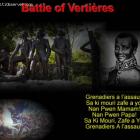 Battle of Vertieres
Battle of Vertieres 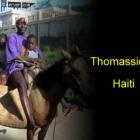 Thomassique, Haiti
Thomassique, Haiti 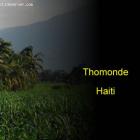 Thomonde, Haiti
Thomonde, Haiti 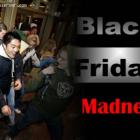 Black Friday Shopping Season
Black Friday Shopping Season 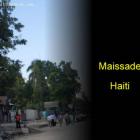 Maissade, Haiti
Maissade, Haiti